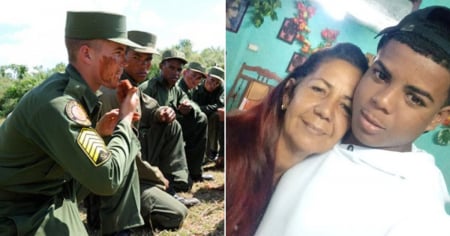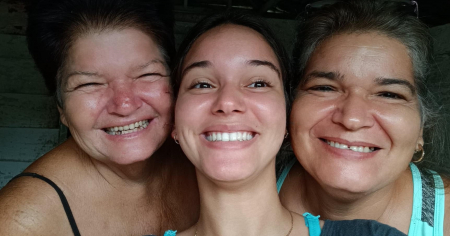Alfredo González, the father of Annier González, an 18-year-old Cuban who committed suicide while serving in the Mandatory Military Service in Matanzas, continues to demonstrate that the pursuit of justice is a lifelong mission for him. He has now spoken out about the conditions and circumstances surrounding the trial of those allegedly responsible for his son's death.
“My son was not a criminal; he was just an immature teenager, responsible and respectful, deserving of better treatment than being treated like a slave before and after his death. Enough with the countless victims of Mandatory Military Service in Cuba; they are human beings, not slaves,” she wrote in the Facebook group “No More VICTIMS in Military Service in Cuba.”
Alfredo shared some of the events that occurred during the twelve days his son was under military service, highlighting how the military justice system operates in Cuba following a trial instigated by his own complaint. “My son was not a criminal; he was merely forced to endure that misfortune,” he said.
Indignant, the father presented reasons that led to inconsistencies in the trial, ranging from the individual who was judged—a captain who was a second lieutenant at the time of his son's death and who rapidly rose in rank—to the coercion exerted by Military Counterintelligence (CIM) on the lawyer who was defending him.
According to Alfredo's complaint, his son had very little preparation time during the pre-call. Of that time, twelve days were spent marching, one day at the shooting range, and one more day for medical examinations.
Annier passed away on July 4, 2021, after being assigned to a shift at the Combinado del Sur prison with only 13 days in the unit and without the proper training to carry a firearm.
On several occasions, his father has expressed that his life has become a living hell since then, lamenting that he did not remove his son from an environment he describes as filled with mediocre officials who are supposed to care for and not mistreat young people.
In February 2024, in front of his son's grave, Alfredo vowed to exhaust all available legal resources and, if he received no answers, expressed his willingness to take to the streets in search of justice. He denounced that the prosecutors and officials involved in the case have lied and failed to fulfill their duties, holding them responsible for Annier's death.
Despite approaching various institutions, Alfredo claims he has not received satisfactory responses. Recently, he reported that a file appeared in the Prosecutor's Office containing an alleged investigation by the Ministry of the Interior (MININT), which he believes is rife with inaccuracies and falsehoods, carried out in a careless manner.
He criticized the attempt to hold his son accountable, claiming a psychopathic adaptation issue related to military service, when, according to him, the true culprits are the institutions that allowed the abuses to occur.
In a country where dissent is suppressed, the words of this father represent an act of courage that highlights the suffering of many Cuban families, even though similar cases have been reported in independent media.
Frequently Asked Questions about Mandatory Military Service in Cuba
Why is Mandatory Military Service a problem in Cuba?
Mandatory military service in Cuba is a significant issue due to the inhumane conditions and abuse faced by recruited young people. Cases like that of Annier González, who committed suicide due to lack of preparation and mistreatment, highlight the risks and suffering that many young people endure. Furthermore, families are subjected to pressure and penalties if their children do not fulfill this obligation imposed by the Cuban regime.
What legal consequences do those who refuse to fulfill military service face?
Young people who refuse to fulfill military service in Cuba may face imprisonment and fines. For instance, Sergio Díaz Suria was incarcerated for refusing to participate in military service, highlighting the repression and severe legal consequences for those who disobey this government-mandated obligation.
What risks do young people face during Mandatory Military Service in Cuba?
Young people face significant risks during Mandatory Military Service in Cuba, including mistreatment, precarious living conditions, and threats to their physical and mental integrity. Cases of deaths and suicides among recruits, such as that of Nesky Gabriel Escalona Ortiz, highlight the severity of the situation. These risks are compounded by a lack of adequate medical care and abuse of authority by officials.
How does Mandatory Military Service affect Cuban families?
Mandatory Military Service in Cuba severely impacts families, placing emotional and financial burdens on them. Families like that of Sandra Jiménez Cruz face threats of fines and imprisonment if their children do not fulfill the service, which further destabilizes their already precarious living conditions. This obligation also deprives families of their children's support during critical times.
Filed under:






